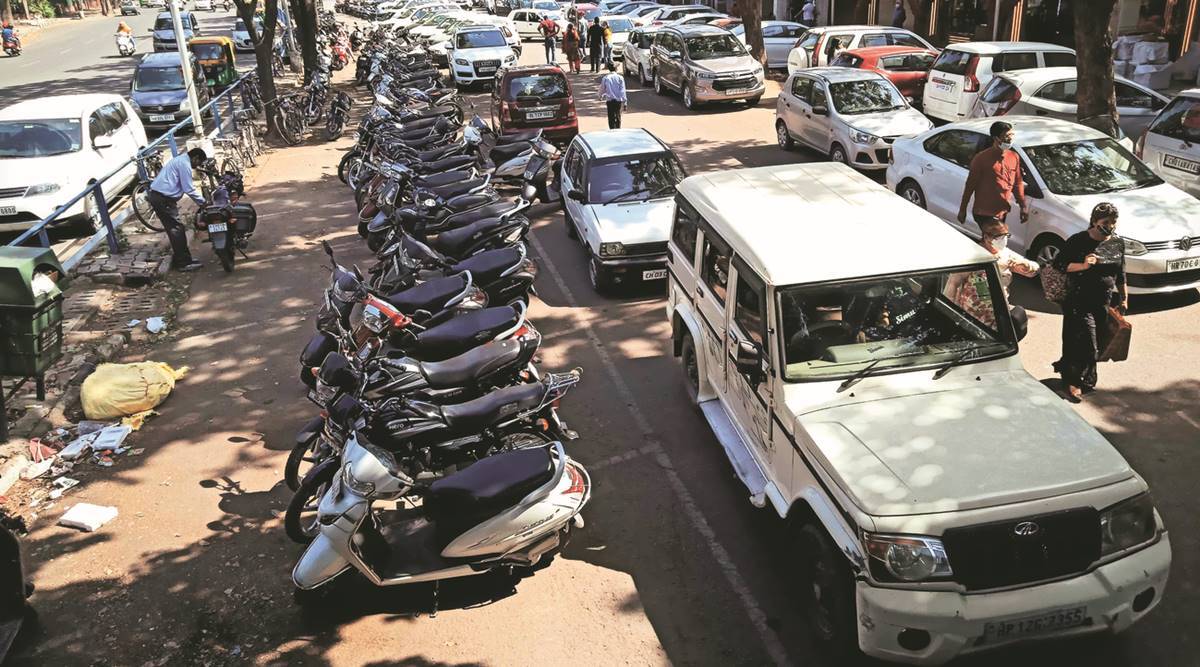 Challenges of conventional parking were also studied and it was found that there is no real-time tracking or data/report for analysis.
Challenges of conventional parking were also studied and it was found that there is no real-time tracking or data/report for analysis. Time is wasted in searching for a parking slot which leads to traffic congestion. It is not just leading to stress to users but also causes pollution, the study of parking lots in the city by RITES (Rail India Technical and Economic Service) has found.
The agency has suggested discouraging use of personal vehicles by plying of staff buses and staggering of school and office timings to reduce the parking demand.
RITES surveyed around 20 main parking lots. The survey also found that peak parking accumulation, that is maximum concentration, is in Sector 35, Chandigarh, in front side of showrooms. It is 1,055 vehicles. Chandigarh has about 89 parking lots and the total area of parking is about 5.22 lakh sqm. Primary survey has been conducted at 20 major parking locations.
Challenges of conventional parking were also studied and it was found that there is no real-time tracking or data/report for analysis.
Subscriber Only Stories
It was said that “time is wasted in searching for a parking spot. Traffic congestion is there due to automobiles searching for parking spot and it not just leads to stress to users but also causes pollution etc”.
It was also stated that there is no flexibility in parking charges. Major parking locations that were researched were ISBT, Sector 17, Sector 26 market, Housing Board, IT Park, Sukhna Lake and Elante Mall.
49 PC OF COMMUTERS PARK ONLY FOR SHORT DURATION — UP TO 2 HOURS
The study found that in the car parking duration, about 49 per cent of them park for short term, that is up to two hours, 23 per cent park for medium term, that is two to six hours, and 28 per cent park for long term, that is more than six hours. The study found that about 50 per cent of cars and two-wheelers are parked for short-term duration only.
It was suggested that in the long run, citywide mass public transport system needs to be provided and will be the key not only to reduce congestion on roads but also to control parking demand.
As part of the proposed interventions suggested to optimise and manage the parking as in short-term measures, it was specified that private vehicles must be parked on a fully paid rented or owned space based on the ‘user pays’ principle.
HIGH PRICING DURING PEAK HOURS, LESS DURING NON-PEAK HOURS
Among the suggestions given to improve the congestion and parking, it was specified that variable pricing –– pricing to be based on hour of the day with higher charges for peak hours and comparatively less during non-peak hours — should be adopted.
It was specified that the most convenient parking was by the hour for use by customers and less convenient parking by the month for use by employees.
Prioritising parking spaces for physically disabled, electric vehicles, bicycles, pick and ride and feeder system was also suggested apart from the fact that the parking space efficiency too needs to be maximised by classifying parking lots into long- and short-term parking areas with reflective tariff plan. Sizing a portion of spaces for motorcycles and compact cars also help in optimising the parking, it was suggested.
It was stated that parking enforcement policy too must have a provision for strict penalty against misuse, encroachment of public land and pedestrian space, diversion of parking area for other purposes.
- The Indian Express website has been rated GREEN for its credibility and trustworthiness by Newsguard, a global service that rates news sources for their journalistic standards.

